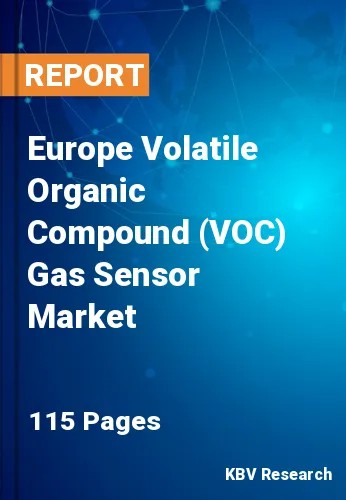The Europe Volatile Organic Compound (VOC) Gas Sensor Market would witness market growth of 4.9% CAGR during the forecast period (2023-2029).
High vapor pressure and low boiling point are related to volatility, which is the proportion of the molecules in the sample in the surrounding air. VOCs make up the odor of fragrances and colognes as well as the odor of pollutants. As attractants for pollinators, predator defense, and even inter-plant interactions, VOCs are crucial for animal and plant communication.
Many VOCs can be harmful to the environment or human health. Anthropogenic VOCs are subject to legal restrictions, particularly indoors, where concentrations are higher. Most VOCs do not have immediate harmful effects but can have long-term, chronic health impacts. Certain volatile organic compounds have found applications in pharmacies, whereas others have been subject to administrative limitations due to the recreational use that certain people make of them.
European nations' infrastructure and technological advancement is generating significant revenue growth potential for companies offering cutting-edge solutions. In addition, several nations have ratified international agreements to limit air pollution emissions, passing stricter legislation. Furthermore, the European Union has established strict rules to combat air and environmental pollution. This motivates businesses to focus on creating dependable and user-friendly methods for identifying and mapping the concentration of dangerous and polluting gases, as well as using sources of renewable energy for sustainable development. It is essential to have sensors that can quickly acquire and transmit data in real-time, which is in great demand and helping the region's economy expand. Hence, the region presents lucrative growth prospects for the market.
The Germany market dominated the Europe Volatile Organic Compound (VOC) Gas Sensor Market by Country in 2022 and would continue to be a dominant market till 2029; thereby, achieving a market value of $14,188.4 Thousands by 2029. The UK market is exhibiting a CAGR of 4% during (2023 - 2029). Additionally, The France market would witness a CAGR of 5.6% during (2023 - 2029).
Based on Type, the market is segmented into Multiple Gas Detection Sensor and Single Gas Detection Sensor. Based on Application, the market is segmented into Oil & Gas, Agriculture, Manufacturing, Chemical Industry, Automotive, Metals & Mining, Food & Beverages, and Others. Based on Technology, the market is segmented into Metal-oxide Semiconductor, Infrared-based Detection, Photo-Ionization Detector (PID) and Others. Based on countries, the market is segmented into Germany, UK, France, Russia, Spain, Italy, and Rest of Europe.
Free Valuable Insights: The Worldwide Volatile Organic Compound (VOC) Gas Sensor Market is Projected to reach USD 216.1 Million by 2029, at a CAGR of 5.3%
The market research report covers the analysis of key stake holders of the market. Key companies profiled in the report include Honeywell International, Inc., Siemens AG, Alphasense, Inc., Bosch Sensortec GmbH (Robert Bosch GmbH), ABB Ltd, Renesas Electronics Corporation, Sensirion AG, Interlink Electronics, Inc. (KWJ Engineering, Inc.), SGX Sensortech (Amphenol Corporation), and ION Science Ltd.
By Type
By Application
By Technology
By Country
Our team of dedicated experts can provide you with attractive expansion opportunities for your business.

